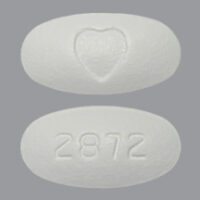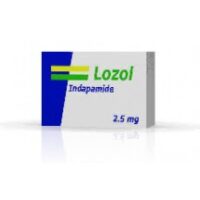Description
Drug Uses
Zestril is used for treatment of high blood pressure alone or with other medicines. It is used along with other medicines to manage heart failure or improve survival after a heart attack. It may also be used for other conditions as determined by your doctor.
How Taken Use Zestril as directed by your doctor. To avoid stomach upset take Zestril with a meal.
Warnings/Precautions
Before taking Zestril, tell your doctor or pharmacist if you have any medical conditions, especially if you have allergies to medicines, if you are allergic to any ingredient in Zestril, if you have a history of heart problems (e.g., heart failure, aortic stenosis), blood vessel problems, blood flow problems, bone marrow problems, kidney problems, or diabetes, if you have a history of stroke, recent heart attack, or kidney transplant, if you have an autoimmune disease, are dehydrated or have low blood volume, have high blood potassium levels, low blood sodium levels, or are on a low salt (sodium) diet, if you are on dialysis, are scheduled to have major surgery, or you are a woman of childbearing age, if you are pregnant, planning to become pregnant or are breast–feeding. Zestril may cause birth defects or fetal death if you take it while you are pregnant. If you think you may be pregnant, contact your doctor right away. It is not known if Zestril is found in breast milk. Do not breast–feed while taking Zestril. Some medicines may interact with Zestril. Therefore tell your doctor of all prescription or nonprescription medicine, herbal preparation, or dietary supplement that you are taking. Do not take Zestril if you have a history of angioedema, including angioedema caused by treatment with an ACE inhibitor or if the patient is a child with severe kidney problems. Zestril may cause a serious side effect called angioedema. Contact your doctor at once if you develop swelling of the hands, face, lips, eyes, throat, or tongue, difficulty swallowing or breathing, or hoarseness. Zestril may not work as well in black patients. They may also be at greater risk of developing angioedema. Contact your doctor if your symptoms do not improve or if they become worse. Dehydration, excessive sweating, vomiting, or diarrhea may increase the risk of low blood pressure. Contact your doctor at once if any of these occur. Check with your doctor before you use a salt substitute or a product that has potassium in it. Tell your doctor or dentist that you take Zestril before you receive any medical or dental care, emergency care, or surgery. If you have high blood pressure, do not use nonprescription products that contain stimulants. These products may include diet pills or cold medicines. Zestril may affect your blood sugar. Check blood sugar levels closely. Elderly patients may be more sensitive to the effects of Zestril. Zestril should not be used in children younger than 6 years old. Safety and effectiveness in these children have not been confirmed.
Missed Dose
If you miss a dose take it as soon as you remember. However if it is almost time for the next dose, skip the Missed Dose and continue your regular dosing schedule. Do not take a double dose to make up for a missed one.
Possible Side Effects
Some of the Possible Side Effects are– Cough, diarrhea, dizziness, headache, tiredness. Contact your doctor if any of these or other side effects occur. If you experience any of the following serious side effects, you should seek medical attention immediately– Severe allergic reactions (rash, hives, itching, difficulty breathing, tightness in the chest, swelling of the hands, eyes, mouth, face, lips, or tongue, hoarseness), chest pain, dark urine, decreased urination, difficulty swallowing, infection, irregular or slow heartbeat, stomach pain (with or without nausea or vomiting), symptoms of low blood pressure (e.g., fainting, severe dizziness, lightheadedness), yellowing of the skin or eyes.
Storage
Store Zestril at 59 – 86 °F (15 – 30 °C). Store away from heat, moisture, and light. Do not store in the bathroom. Keep Zestril out of the reach of children.
Overdose
If overdose is suspected seek medical attention immediately. Some of the symptoms of Zestril overdose are– fainting, severe dizziness or lightheadedness, weakness.
More Information
Zestril may cause dizziness, lightheadedness, or fainting. These effects may worsen if Zestril is taken with alcohol or certain other medications. Use Zestril with caution. Do not drive or perform other possibly unsafe tasks until you know how you react to this drug. If your symptoms do not improve or if they worsen, contact your doctor. Zestril should be used only by the patient for whom it has been prescribed. Do not take less or more or take it more often than prescribed by your doctor
Disclaimer
This is only general information, it does not cover all directions, drug integrations or precautions. You should not rely on it for any purpose, it does not contain any specific instructions for a particular patient. We disclaim all responsibility for the accuracy and reliability of this information. We`re not responsible for any damage.




Reviews
There are no reviews yet.